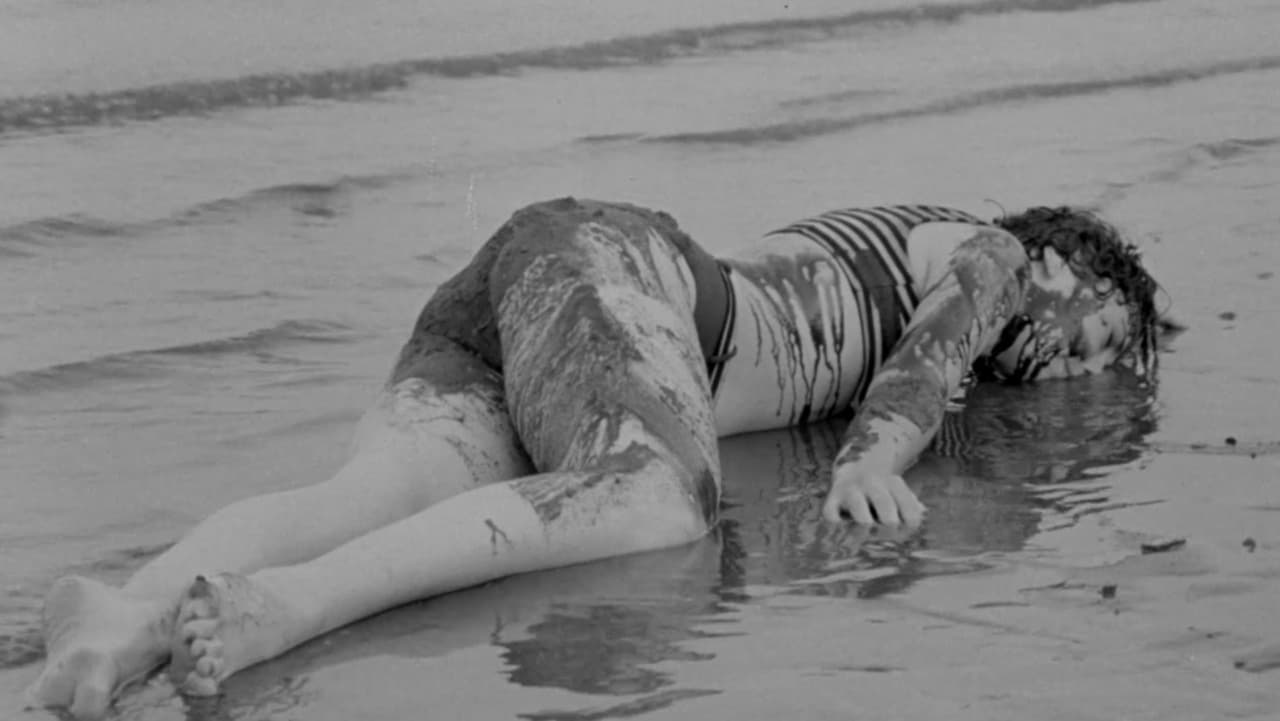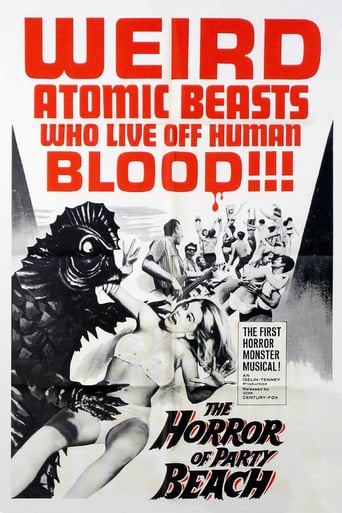Inclubabu
Plot so thin, it passes unnoticed.
SpecialsTarget
Disturbing yet enthralling
Tayloriona
Although I seem to have had higher expectations than I thought, the movie is super entertaining.
Frances Chung
Through painfully honest and emotional moments, the movie becomes irresistibly relatable
Aaron1375
This film is a rather bad little monster film from the 60's that is most notable for having monsters that look as if they have hot dogs or pickles shoved in their mouths. Your pick, it could be either one considering this film is in black and white. The film was riffed by Mystery Science Theater 3000, but the score here is not because they riffed this movie, this film was made fun of many times before it aired on that show. I remember something that came on HBO and predated MST3K that featured a lot of well known comedy actors and SNL alum. I remember John Candy was in it, Gilda Radner and Dan Aykroyd as long as a few others...I even think Cheech and Chong were in it and they basically showed clips of horrible movies and riffed them. This is one of the films they made fun of as I believe Gilda Radner did this one and even she commented on the absurdity of the monsters and suggested they had hot dogs in their mouths. So no, this film is not some beloved classic that only has a low score because of MST3K, but it is a bad film in general. A film featuring singing and dancing at the beach for the first portion of the film and then becomes a horror movie where there really seems to be no sense of urgency in killing the monsters despite knowing their weakness.The story, well, as I have said there is a party going on at the beach. A couple who seem to hate each other attend and the girl flirts and despite the fact the guy apparently loathes her, he gets jealous and angry when she tries to have some fun. Offshore, however, there is some illegal dumping of toxic waste going on...well, I only assume it was illegal, considering the time this film took place the dumping may have been a okay. Well, this toxic waste has no effect on the marine life, but does cause dead bodies to rise and become aquatic monsters! Makes sense right? No effect on living things, but can bring the dead back to life...and I am also kind of wondering why there were so many dead corpses just offshore for the waste to affect. Well, the girl gets killed and her death sparks a monster outbreak and pretty much ends the party at horror beach. The rest of the film is watching people killed by the monsters at slumber parties, as they take wrong turns or just out for a stroll while a scientist and the arrogant prick who caused his girl's death moves on to another girl. Of course, a solution to the monster problem is found when someone accidentally knocks over a glass of sodium by a monster's arm...cause you know, they would have the one thing that could save the world right on the desk by the monster arm. What are the odds? This made for a very funny episode of MST3K as it is a film that deserved to be riffed as most of the films that they riff are. Just because you liked it as a child does not mean it was a good film, lots of films I remember fondly turn out to be rather bad when I watch them again. Does not mean I cannot still enjoy them, but it also does not make the film a classic that should be revered either. The jokes were aplenty as they made fun of the monsters, the strange dubbing of the lead girl and the band at the beach. So much stuff in this one to lampoon and if you do not see it, you have no sense of humor.So yes, this film is bad. I only give it a two rather than a one because they did a rather good job at the transformation scene and the icky monster arm effect too. Otherwise, just a film featuring monsters with hot dogs in their mouths going on the attack. I am going to guess that they were implying that the hot dogs were like some sort of things the monsters used to suck the blood out of their victims, but they kind of were overkill. Too many, as they could have simply had one and actually made it move so that perhaps they could have shown the blood sucking. Unfortunately, though, the only sucking we see is the movie itself.
TheLittleSongbird
The Horror of Party Beach to me is not a good movie, but it's not one of the worst movies ever made and there are worse horrors out there(ie. Manos). While not particularly great music, the soundtrack is catchy, while the slumber party scene is a classic and Eulabelle Moore brings some gusto in her role. The rest of the acting though is laughably terrible, especially from Alice Lyon, a beautiful woman but has an acting range that ranges from total blank to unnaturally forced. The choreography doesn't match the energy that the soundtrack has, much of it is repetitive and looks improvised, which gives the movie a rather amateurish feel to it. Visually, The Horror of Party Beach is a poor-looking movie, it is very choppily shot and the monsters as well as having no personality or menace whatsoever look ridiculous, very reminiscent of men in cheaply-rendered suits. The dialogue is hilariously cheesy and awkward sounding, accentuated even further by the line delivery. It's one of those cases also where you wonder whether the writers actually proof-read what they wrote to check whether it made sense, which is unlikely. The story has a lot of ponderously-paced patches, because it is so thinly structured and heavily padded there is the question of whether there is a story there, when there is it is even more senseless than the dialogue. The attacks excepting the slumber party scene are hurriedly edited and hold no surprises or thrills, they're gory but the gore doesn't add a huge amount. In conclusion, a really bad movie but there is some entertainment value, something that Manos did not have. 3/10 Bethany Cox
MartinHafer
A barrel of, what else, radioactive waste falls into the ocean off Party Beach. When it mixes with corpses on the sea bed, they are magically transformed into horny killer monsters that mostly seem to attack ladies--killing some and taking others with them under the sea for mating or to perhaps to fill their pantries.In the end, the monsters are killed with sodium!!! First, didn't anyone consider this is found in salt water and the water should have killed them or at least hurt a bit! This is especially silly because they learn about this when a beaker filled with sodium and water is accidentally dumped on a severed zombie-sea monster arm!! Second, the "scientist" called sodium a metal. Yeah, on what planet?! Talk about a stupid "scientific" explanation! THE HORROR OF PARTY BEACH has the distinction of being one of the films chosen for inclusion in the great book "The Fifty Worst Movies of All Time" by Harry Medved. While there are many rotten drive-in horror films of the 50s and 60s, I can't quibble much at the author's decision to pick this film. While it may or may not be THAT bad, it is certainly terrible enough that I can understand its choice.One of the big problems with this rock and roll horror film is that as far as the rock goes, the Del-Aires were simply terrible--perhaps as bad as the singing of Arch Hall, Jr. in EEGAH!--another inclusion in Medved's book. The words are stupid, their voices are pretty lame and the songs are just awful--the sort of group that might have, perhaps, played at Bar-Mitzvahs or proms but certainly not in movies. But, fortunately, they are so bad that they provide a good laugh. I especially loved the horrible "Zombie Stomp" and the final song as the credits rolled--uggh they were bad! Another problem is that not a single person connected with the film has any idea what they are doing--including the director and the "actors" (?). In particular, I liked seeing Alice Lyon as the world's oldest teenager (looking close to 40 and with a poorly dubbed voice that was noticeably off). While she is bad, even worse is Eulabelle Moore who plays a horribly stereotypical superstitious Black lady. Having her talking about voodoo and all that hocus pocus was downright embarrassing and it's surprising to see such an obvious negative stereotype in the era of the Civil Rights legislation. Apparently they didn't hear about the Civil Rights Act in Connecticut where they filmed this! As for the monsters, they were kind of neat in a silly, kitschy way, but I sure wonder why they decided to stuff about a half dozen large cucumbers in their mouths. Many thought they looked like bun-less hot dogs. Either way, it looked very strange and quite phallic, so it was good for a laugh.Also, I know this will sound very, very catty, but the kids at the beach in this film looked,...well....very ordinary. All the girls and guys looked very plain and ordinary. None of the girls looked like Annette Funicello, Ann-Margaret or even Deborah Walley. You'd think it being a beach film they'd get a few bathing beauties or at least people who looked decent in bikinis. At least that might have provided SOME entertainment!! Overall, it's very bad and very silly. I'll give it an extra point simply because it was oddly entertaining but rest assured, it is truly bad--but at least more entertaining than films like ROBOT MONSTER--which is just bad..Also from the great director, Del Tenney, are classics such as I EAT YOUR SKIN and CURSE OF THE LIVING CORPSE (which isn't THAT bad, surprisingly). You can see him in a brief cameo in the film as well as in an interview on the DVD--where he seems like a nice unassuming man.Also, despite this being a horrible project, one of the actors in the film actually went on to a decent film career. Wayne Tippit (who played a drunk who became monster chow) has a lot of credits that followed this film--proving even decent actors sometimes start at the very, very bottom and manage to find their way.
lordzedd-3
Okay folks, I gotta dilly for ya this time. Let's start with the monster designs, unique but way goofy. To goofy for school, but I can live with goofy monster designs. After all, I love Power Rangers and some of their monsters can be goofy. The concept basically works, the odds of toxic waster mutating those plankton hanging around a skeleton is pretty high. Now the real mean of why I was disappointed with HORROR OF PARTY BEACH, all the musical filler. Why, oh why did practically every movie in the 1960s have to have at least 1 musical number? They padded the film way to much. To me it was more THE PARTY OF HORROR BEACH instead of the other way around. But there are some likable qualities to this movie, so 2 STARS

